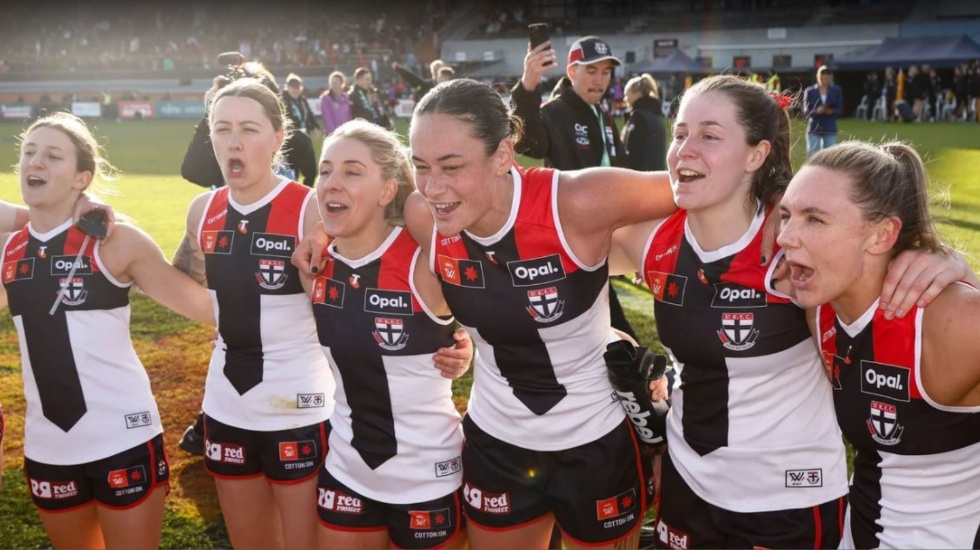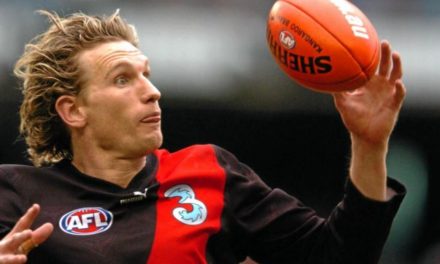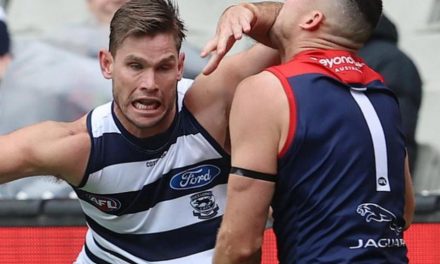St Kilda’s AFLW team belt out the theme song after defeating Essendon at Windy Hill last Sunday. Photo: AFL MEDIA
After three rounds of the AFLW season, St Kilda hopes to continue defying mathematician and physicist Sir Isaac Newton’s famous line: “What goes up, must come down.”
There’s no denying that the Saints so far are off to a flyer in 2024, winning their first three games on the trot to start the campaign. They’re sitting atop the ladder with a commanding percentage of 227.9, and the 61 points they’ve conceded is lowest in the competition.
St Kilda started last season with a mediocre 2-3 win-loss record, but stormed home to win four of its remaining five games. They were left heartbroken, though, finishing ninth and missing out on a finals berth by just four percentage points.
So, one can’t really blame the sceptics who bemoan the Saints’ inconsistency of the last few seasons, and are suggesting “we’ve seen this all before.”
Indeed, two years ago in season 7, the Saints got off to a 2-0 start, hammering then-first-year opponents Sydney and Hawthorn by a combined score of 119-37. But eventual premier Melbourne brought St Kilda crashing back down to earth the following week, beating the Saints by 26 points and sending them into a tailspin from which they never recovered, going 1-6 the rest of the season and finishing 13th.
Despite their third straight victory, against Essendon last weekend, there were warning signs. In scraping home by eight points at Windy Hill, St Kilda kicked just three goals. And the Bombers gift-wrapped two of them due to breakdowns in discipline, resulting in 50-metre penalties that put the free kick recipients on the doorstep of goal.
Essendon conceded 29 free kicks for the match, yet easily won the inside 50 count. The Bombers simply couldn’t convert their opportunities into enough scoring shots, with St Kilda defender Serene Watson standing tall down back, leading her side with 22 possessions and eight marks.
This week, St Kilda plays Hawthorn, which will make for a fascinating encounter. The Hawks are an up-and-coming side, and eerily like the season 7 Saints, started well at 2-0.
The Hawks belted Carlton and Collingwood in succession by a combined score of 139-54 before being brought down from the clouds on Sunday by perennial premiership threat Adelaide. The Crows, like the Saints, are currently unbeaten, but are second on percentage.
PLEASE HELP US CONTINUE TO THRIVE BY BECOMING AN OFFICIAL FOOTYOLOGY PATRON. JUST CLICK THIS LINK.
If the Saints are to make the eight this season, make no mistake, the Hawthorn match and their clash with Fremantle in round five are must-wins. Here’s why: Sydney, Gold Coast, Geelong, and Melbourne – all finalists last year – are currently all mired near the bottom of the ladder due to sputtering starts. If results and ladder positions from last season track to this season, then St Kilda should beat both the Hawks and Fremantle.
If St Kilda is 5-0 before facing the Crows in round six, with five more matches to go, it would take an epic collapse to fail to make the eight.
How epic? Consider the Saints’ run home. In rounds seven through nine, they have dates with GWS (10th), Port Adelaide (11th), Western Bulldogs (18th), before an end-of-season home match against reigning premier Brisbane.
With no players in the top 20 for average disposals and only one, Darcy Guttridge, among the top 20 for goals, the Saints so far have been capitalising on their own team effort and opponents’ mistakes.
That trend must continue, and if the Crows defeat the Saints in round six as would be expected, they must avoid self-destructing again after such a reversal.
At potentially 8-2, though, St Kilda would would almost certainly finish top four, if not top two, and make it by far the AFLW’s surprise packet. But as the Saints themselves would be the first to say, footy is played on grass, not paper.
They just have to keep winning and hope the theory of 17th Century Swiss mathematician Jacob Bernoulli, is on their side. He’s credited with the law of averages, which in simple terms states “the relative frequency of an event should correspond to its probability.”
Still, this is St Kilda. And as Bernoulli also once said, “It is utterly implausible that a mathematical formula should make the future known to us, and those who think it can would once have believed in witchcraft.”
For a team still desperately trying to prove its credentials, there will be no magic potion.











